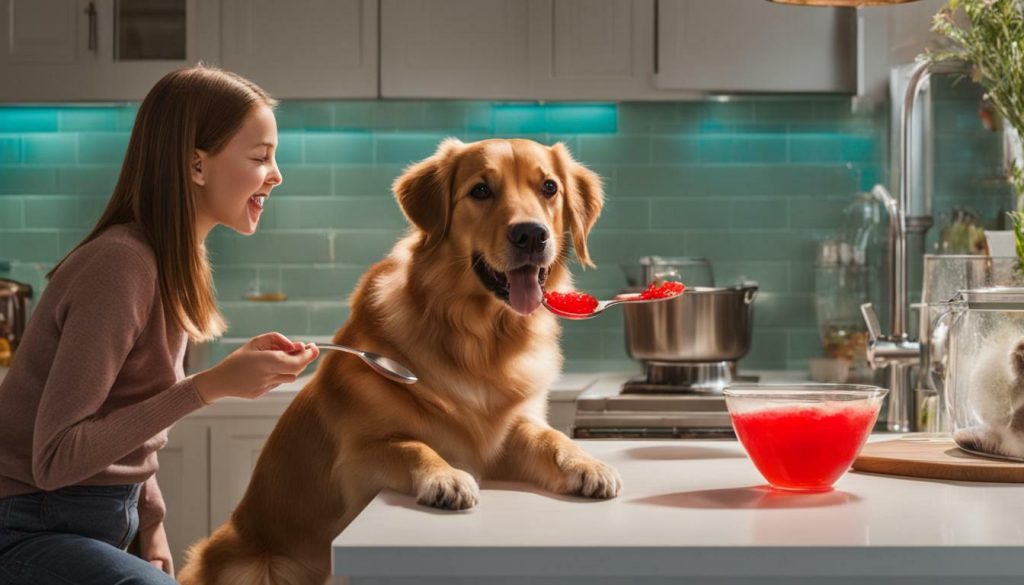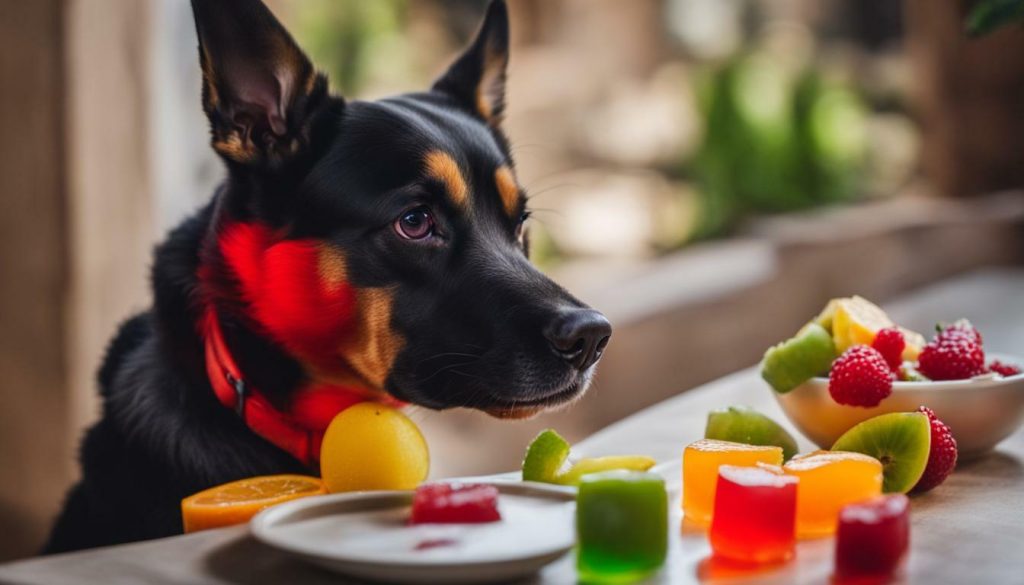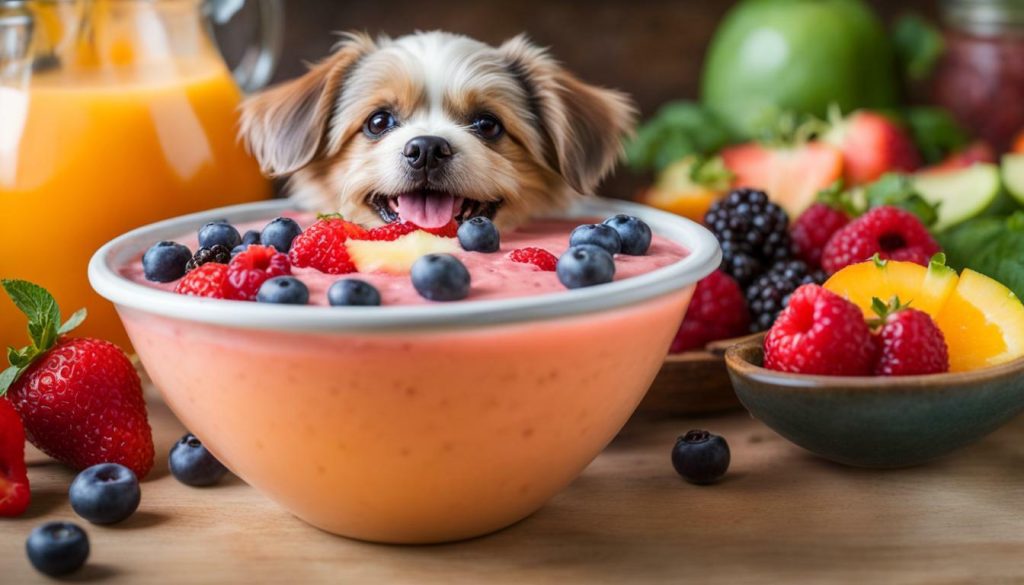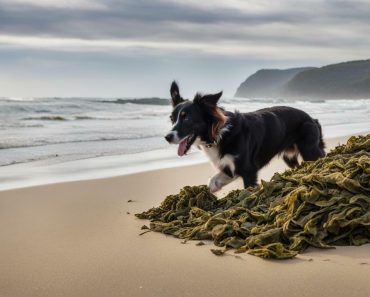
If you’ve ever wondered, “Can dogs eat jello?” you’re not alone. Many pet owners are curious about whether this popular gelatin-based dessert is safe for their canine companions. In this guide, I will provide you with all the information you need to know about dogs and jello consumption, ensuring the well-being and safety of your furry friend.
Key Takeaways:
- Jello can be safe for dogs in small amounts, as long as it does not contain xylitol, an artificial sweetener that is toxic to dogs.
- Most store-bought jello contains unhealthy ingredients like sugar, artificial flavors, and food coloring, making it an unhealthy treat for dogs.
- Plain, unflavored gelatin is safe for dogs and can provide benefits for their skin, joints, and bones.
- Avoid giving dogs flavored jello, sugar-free jello with xylitol, and jello shots with alcohol.
- Homemade jello treats made with unflavored gelatin and dog-safe ingredients can be a healthier option for dogs.
- Always consult with a veterinarian to determine what foods are safe for your dog to eat.
Is Jello Safe for Dogs?
When it comes to the safety of giving jello to your dog, there are a few factors to consider. While jello itself is not inherently toxic to dogs, it’s important to be mindful of the ingredients it contains. Most store-bought jello products are loaded with unhealthy additives like sugar, artificial flavors, and food coloring, which can have negative health implications for dogs.
Jello that contains xylitol, an artificial sweetener, should be strictly avoided, as it is highly toxic to dogs. Xylitol can cause a sudden release of insulin in dogs, leading to a dangerous drop in blood sugar levels. It can result in symptoms such as vomiting, diarrhea, loss of coordination, seizures, and in severe cases, liver failure.
Plain, unflavored gelatin is a safer option for dogs. In fact, gelatin can have some benefits for dogs when consumed in moderation. It contains collagen, which is beneficial for their skin, joints, and bones. However, it’s important to note that gelatin alone should not be a primary source of nutrition for dogs, and it should not be flavored or sweetened.
| Jello Safety Tips for Dogs: | |
|---|---|
| Avoid jello with xylitol | ✔️ |
| Choose plain, unflavored gelatin | ✔️ |
| Avoid flavored or sweetened jello | ✔️ |
If you want to give your dog a jello-like treat, it’s best to make your own homemade version. By using unflavored gelatin and dog-safe ingredients, you can ensure a healthier option for your furry friend. Remember to always consult with your veterinarian before introducing any new foods or treats to your dog’s diet to ensure their safety and well-being.

Remember:
“When it comes to the safety of giving jello to your dog, it’s important to prioritize their health and well-being. Avoid jello with xylitol, opt for plain gelatin instead, and consult with your veterinarian before making any dietary changes.”
The Ingredients in Jello and Their Effects on Dogs
The ingredients in jello can have different effects on dogs, and it’s essential to understand these implications before offering it to your furry friend. While plain, unflavored gelatin is safe for dogs and can even provide some health benefits, it is crucial to avoid giving dogs flavored jello, sugar-free jello with xylitol, and jello shots with alcohol. Let’s take a closer look at the ingredients commonly found in jello and their potential risks for dogs:
1. Sugar: Most store-bought jello contains high amounts of sugar, which can contribute to obesity, dental issues, and even diabetes in dogs. It’s best to limit your dog’s intake of sugary jello or avoid it altogether to maintain their overall health.
2. Artificial Flavors and Colors: Jello often contains artificial flavors and food coloring, which can be problematic for dogs. These additives may cause digestive upset, allergic reactions, or even hyperactivity in some dogs. It is advisable to choose natural and dog-friendly treats instead.
3. Xylitol: Xylitol is an artificial sweetener commonly found in sugar-free jello and other sugar-free products. It is highly toxic to dogs and can lead to severe hypoglycemia (low blood sugar) and liver damage. Always check the label for xylitol before giving any jello to your dog.
4. Alcohol: Jello shots with alcohol should never be given to dogs. Alcohol can cause alcohol poisoning and other serious health issues, including liver damage and neurological problems. Keep jello shots out of your dog’s reach to ensure their safety.
Remember, homemade jello treats made with unflavored gelatin and dog-safe ingredients can be a healthier alternative for dogs. However, it’s always recommended to consult with a veterinarian about what foods are safe and appropriate for your dog’s diet. Your veterinarian can provide personalized advice based on your dog’s specific needs and health conditions.

Healthier Alternatives to Jello for Dogs
If you’re looking for healthier alternatives to jello for your dog, there are plenty of options available that can satisfy their taste buds while keeping them safe and healthy. Most store-bought jello contains ingredients like sugar, artificial flavors, and food coloring, which are not ideal for a dog’s diet. However, you can easily make homemade jello treats using unflavored gelatin and dog-safe ingredients.
One alternative is to use fruit purees as a base for your dog’s jello treats. Pureed fruits like apples, bananas, or berries can provide natural sweetness and flavors without any added sugar. Simply mix the fruit puree with unflavored gelatin and let it set in the refrigerator. Your dog will enjoy the fruity taste while reaping the nutritional benefits of fresh fruits.
Another option is to make gelatin treats using chicken or beef broth. Mix the broth with unflavored gelatin and refrigerate until set. These savory gelatin treats can be a great source of hydration for your dog, especially during hot summer months. You can even add small chunks of cooked meat or vegetables for an extra tasty and nutritious twist.
Remember, it’s important to always check with your veterinarian before introducing any new foods or treats into your dog’s diet. They can provide guidance on portion sizes and ensure the ingredients are safe for your dog’s specific needs. By opting for healthier alternatives to jello, you can provide your furry friend with a delicious and nutritious treat that they’ll love.
Table: Homemade Jello Treat Recipes
| Recipe | Ingredients | Instructions |
|---|---|---|
| Fruity Delight | Unflavored gelatin, fruit puree (e.g., apple, banana, berries) | 1. Dissolve gelatin in water according to package instructions. 2. Mix in fruit puree. 3. Pour into molds or a container. 4. Refrigerate until set. 5. Serve to your dog in moderation. |
| Savory Broth Jello | Unflavored gelatin, chicken or beef broth, optional cooked meat or vegetables | 1. Dissolve gelatin in water according to package instructions. 2. Mix in broth and any additional ingredients. 3. Pour into molds or a container. 4. Refrigerate until set. 5. Serve to your dog in moderation. |
Note: Always use unflavored gelatin and avoid adding any ingredients that may be toxic to dogs, such as onions or garlic. Additionally, ensure the jello treats are given in moderation as part of a balanced diet.

Consult with a Veterinarian
When it comes to determining whether dogs can eat jello, it’s always best to consult with a veterinarian who can provide personalized guidance based on your dog’s specific needs and health conditions. While plain, unflavored gelatin can be safe for dogs in small amounts, it’s important to consider the potential risks associated with store-bought jello.
Most jello products contain unhealthy ingredients like sugar, artificial flavors, and food coloring, which can be detrimental to a dog’s health. Additionally, some flavored jello may contain xylitol, an artificial sweetener that is toxic to dogs. It’s crucial to avoid giving dogs jello with these ingredients as it can lead to digestive issues, weight gain, and even poisoning.
If you’re interested in giving your dog a jello-like treat, consider making homemade jello using unflavored gelatin and safe ingredients. There are many dog-friendly recipes available that utilize ingredients like natural fruit puree or low-sodium broth to create a healthier alternative. However, it’s still important to consult with a veterinarian to ensure that the specific recipe and ingredients are suitable for your dog’s dietary needs.

Key Points:
- Consult with a veterinarian before introducing jello or any new food to your dog’s diet.
- Avoid store-bought jello that contains sugar, artificial flavors, food coloring, and xylitol.
- Plain, unflavored gelatin is safe for dogs and can have potential benefits for their skin, joints, and bones.
- If making homemade jello, use dog-safe ingredients and consult with a veterinarian to ensure it aligns with your dog’s dietary needs.
Remember:
“Your dog’s health should always be a priority. Consulting with a veterinarian ensures that you make informed decisions about what treats and foods are safe for your furry friend.”
| Ingredient | Safety Level |
|---|---|
| Plain, unflavored gelatin | Safe in moderation |
| Sugar | Avoid excess consumption |
| Artificial flavors and food coloring | Avoid |
| Xylitol | Extremely toxic, avoid completely |
Conclusion
While dogs can safely consume plain, unflavored gelatin, store-bought jello with unhealthy ingredients is not recommended for their overall well-being. It’s crucial to prioritize your dog’s health by opting for healthier alternatives and consulting with a veterinarian for personalized guidance.
Factual data: Jello can be safe for dogs to eat in small amounts, as long as it does not contain xylitol, an artificial sweetener that is toxic to dogs. Most store-bought jello contains unhealthy ingredients like sugar, artificial flavors, and food coloring, so it is not a healthy treat for dogs. Plain, unflavored gelatin is safe for dogs and can even be beneficial for their skin, joints, and bones. It is important to avoid giving dogs flavored jello, sugar-free jello with xylitol, and jello shots with alcohol. Homemade jello treats made with unflavored gelatin and dog-safe ingredients can be a healthier option for dogs. It is always recommended to consult with a veterinarian about what foods are safe for a dog to eat.
By being mindful of what you feed your furry friend, you can ensure they lead a happy and healthy life. When it comes to jello, it’s best to stick to plain, unflavored gelatin without any added ingredients that may be harmful to dogs. Homemade jello treats made from scratch using dog-safe ingredients can be a great alternative. These treats can be tailored to your dog’s specific dietary needs and preferences, providing them with a tasty and safe reward.
In any case, it’s essential to consult with a veterinarian before introducing any new foods or treats into your dog’s diet. They can provide personalized guidance based on your dog’s age, health condition, and specific dietary requirements. A veterinarian will be able to advise you on the best course of action, ensuring that the treats you offer to your dog are both enjoyable and safe.
FAQ
Can dogs safely eat jello?
Jello can be safe for dogs to eat in small amounts, as long as it does not contain xylitol, an artificial sweetener that is toxic to dogs.
Why is most store-bought jello not a healthy treat for dogs?
Most store-bought jello contains unhealthy ingredients like sugar, artificial flavors, and food coloring, which are not beneficial for dogs.
Is plain, unflavored gelatin safe for dogs?
Yes, plain, unflavored gelatin is safe for dogs and can even be beneficial for their skin, joints, and bones.
What types of jello should I avoid giving my dog?
You should avoid giving dogs flavored jello, sugar-free jello with xylitol, and jello shots with alcohol, as these can be harmful to dogs.
Can I make homemade jello treats for my dog?
Yes, homemade jello treats made with unflavored gelatin and dog-safe ingredients can be a healthier option for dogs.
Should I consult with a veterinarian before feeding my dog jello?
Yes, it is always recommended to consult with a veterinarian about what foods are safe for a dog to eat, including jello.






